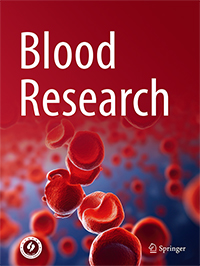Original Article
Korean J Hematol 2007; 42(3):
Published online September 30, 2007
https://doi.org/10.5045/kjh.2007.42.3.241
© The Korean Society of Hematology
Enforced Expression of BMI-1 in Postnatal Human CD34+ Cells Promotes Erythroid Differentiation
이갑상, 김병수, 세재형, Malcolm AS Moore
Enforced Expression of BMI-1 in Postnatal Human CD34+ Cells Promotes Erythroid Differentiation
Background:
The Polycomb-group gene Bmi-1 is known to be a molecular regulator of self-renewal of normal and leukemic stem cells and be involved in various aspects of cellular proliferation, differentiation, and survival.
Methods:
This study evaluated the effects of overexpression of Bmi-1 on human cord blood CD34+ cells. Bmi-1 was introduced into CD34+ cells through lentivirus transduction. Bmi-1 expressing CD34+ cells were applied to colony forming assay, stromal co-culture, and cytokine-stimulatied culture.
Results:
Ectopic expression of Bmi-1 resulted in the increased number of erythroid colonies in primary and secondary colony forming assay in an erythropoietin dependent manner. In stromal co-culture, Bmi-1-expressing postnatal hematopoietic stem cells seemed to lose the ability of self-renewal, as determined by week 5 cobblestone area-forming cell assay and by week 5 secondary colony assay. In cytokine-stimulated suspension culture of Bmi-1-transduced CD34+ cells, we observed increased erythropoiesis marked by Glycophorin A expression.
Conclusion:
Our data suggest that ectopic expression of Bmi-1 in human hematopoietic stem/progenitor cells may result in the differentiation to the erythroid lineage rather than promoting self-renewal.
Keywords Bmi-1, Erythroid differentiation, CD34+ cell
Article
Original Article
Korean J Hematol 2007; 42(3): 241-249
Published online September 30, 2007 https://doi.org/10.5045/kjh.2007.42.3.241
Copyright © The Korean Society of Hematology.
Enforced Expression of BMI-1 in Postnatal Human CD34+ Cells Promotes Erythroid Differentiation
이갑상, 김병수, 세재형, Malcolm AS Moore
Enforced Expression of BMI-1 in Postnatal Human CD34+ Cells Promotes Erythroid Differentiation
Gab sang Lee, Byung Soo Kim, Jae hung Shieh, Malcolm AS Moor
Craniomaxillofacial Life Science, College of Dentistry, Seoul National University, Division of Hematology, Oncology, Korea University Medical Center, Seoul, Korea, Cell Biology Program, Memorial Sloan Kettering Cancer Center
Abstract
Background:
The Polycomb-group gene Bmi-1 is known to be a molecular regulator of self-renewal of normal and leukemic stem cells and be involved in various aspects of cellular proliferation, differentiation, and survival.
Methods:
This study evaluated the effects of overexpression of Bmi-1 on human cord blood CD34+ cells. Bmi-1 was introduced into CD34+ cells through lentivirus transduction. Bmi-1 expressing CD34+ cells were applied to colony forming assay, stromal co-culture, and cytokine-stimulatied culture.
Results:
Ectopic expression of Bmi-1 resulted in the increased number of erythroid colonies in primary and secondary colony forming assay in an erythropoietin dependent manner. In stromal co-culture, Bmi-1-expressing postnatal hematopoietic stem cells seemed to lose the ability of self-renewal, as determined by week 5 cobblestone area-forming cell assay and by week 5 secondary colony assay. In cytokine-stimulated suspension culture of Bmi-1-transduced CD34+ cells, we observed increased erythropoiesis marked by Glycophorin A expression.
Conclusion:
Our data suggest that ectopic expression of Bmi-1 in human hematopoietic stem/progenitor cells may result in the differentiation to the erythroid lineage rather than promoting self-renewal.
Keywords: Bmi-1, Erythroid differentiation, CD34+ cell

Article Tools
Stats or Metrics
Related articles in BR
-
DNA-Protein Interaction of γ-Globin Gene Promoter by Differentiation Inducers
Deok In Kim, Joo In Park, In Hoo Kim
Korean J Hematol 1999; 34(3): 436-444 -
Correlation Between CD34+ Cells/subpopulations and CFU-GM in Cord Blood
Kwang-Lyul Bae, Young, Ho Lee, Sang Soo Park, Eun, Jung Kim, Tae, Hong Kim, Ahn, Hong Choi, Tae, Gyum Kim, Kyung, Hee Kim, Jin, Yeong Han, Jung, Man Kim
Korean J Hematol 1997; 32(2): 214-220 -
Hematologic Recovery after Peripheral Blood Stem Cell Transplantation
Seong Jun Choi, Je Hwan Lee, Cheol won Suh, Na Mi Youm, Young Ran Chae, Sin Kim, Yeong Joo Min, Jin Hee Park, Dai Young Zang, Jong Soo Choi, Sung Bae Kim, Sang We Kim, Kyoo Hyung Lee, Jung Shin Lee, Woo Kun Kim, Sang Hee Kim
Korean J Hematol 1996; 31(2): 235-245




 PDF
PDF Standard view
Standard view Export citation
Export citation Share
Share  Previous Article
Previous Article



